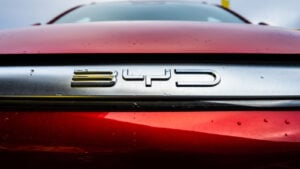
Electric vehicles (EVs) are likely to be the key piece steering the future of private transportation. The world is transitioning from gasoline-only vehicles to hybrids and EVs. Unfortunately, the global electric vehicle market has had better days. Well-known brands like Tesla (NASDAQ:TSLA), as well as smaller EV players, have seen their deliveries growth contract in recent months.
The Global X Autonomous & Electric Vehicles ETF (NASDAQ:DRIV), which holds around 84 EV and autonomous vehicles stocks, has fallen nearly 2% year to date (YTD). This highlights that EV stocks have struggled to perform despite a solid market rally.
Regardless, now may be just the right time to invest in EV stocks, especially those that have seen their valuations plummet recently. Although a slump may blight sales growth in the short term, EVs are increasingly likely to be key in future transportation.
Therefore, let’s examine EV stocks to buy on the dip.
Rivian (RIVN)

Rivian’s (NASDAQ:RIVN) price has plummeted around 55% YTD, creating an enticing buying opportunity for retail investors interested in luxury EVs.
Despite Rivian having solid production and delivery numbers for the first three quarters of 2023, it slipped in Q4. And now that the price has fallen, Rivian probably deserves another look.
The sharp sell-off in Rivian shares could reverse as interest rates decrease toward the end of 2024. Recently, the U.S. Federal Reserve recommitted to three 25-basis point cuts to the Federal Funds rate, decreasing the interest rate down 0.75% in total. For these reasons, Rivian could eventually rally in 2024, rewarding investors who were committed to the company’s long-term success.
Moreover, Wall Street analysts seem to be loving the stock. According to Koyfin, the EV maker has a solid buy rating. If RIVN’s deliveries rebound at some point in 2024, the EV maker could see its share rise.
BYD (BYDDY)

BYD (OTCMKTS:BYDDY) has experienced skyrocketing growth in just the past few years. It began as a smartphone battery maker only to be laughed at by Elon Musk when it initially entered the EV race.
However, BYD has become the world’s top EV maker, trouncing its American rival Tesla in EV sales. In Q4 of 2023, BYD sold 526,409 EVs, while Tesla sold 484,507.
Despite an EV slowdown, BYD is still increasing its sales year over year (YOY). And in January 2024, the company sold 205,588 EVs, up 33.1% YOY, but down more than 34% monthly. Similarly, February sales declined nearly 40%. But this is at least somewhat attributable to the Lunar New Year holiday. The Chinese EV maker was not the only large EV company to report a month-over-month decline in sales growth.
To cushion the slowdown in sales, BYD and its competitors have pursued price cuts in their expensive models. For example, BYD’s Yuan Plus SUV has a price tag of 119,800 yuan, approximately $16,642. That’s nearly 12% less than where it was before. Ever since the company reported its full-year earnings results, analysts have been speculating if this price war has hurt BYD operationally. While net income increased 81% YOY, it came slightly under estimates. This left some analysts to believe BYD’s profit per vehicle sold had decreased.
BYD’s Hong Kong-listed shares fell more than 7% after the earnings report release. The market appears to be overreacting, especially over a slight profit miss. The growth in both revenue and profitability were eye-catching. The other fact of the matter is BYD is and continues to be larger than Tesla in EV sales as well as more profitable.
Aehr Test Systems (AEHR)

Semiconductor equipment manufacturer Aehr Test Systems (NASDAQ:AEHR) globally provides test systems for burning-in and testing logic, optical and memory integrated circuits.
The company is famous for providing testing equipment and services for EV microchip components. EV demand continued throughout 2023, benefitting AEHR revenue growth.
Unfortunately, the ongoing EV market slowdown has led AEHR shares to tumble nearly 58% YTD. The company’s Q2 earnings report released in January highlighted the company’s continued strong growth despite a slowdown in the EV market. Further, AEHR beat Wall Street’s estimates on revenue and EPS.
On the date of publication, Tyrik Torres did not have (either directly or indirectly) any positions in the securities mentioned in this article. The opinions expressed in this article are those of the writer, subject to the InvestorPlace.com Publishing Guidelines.




